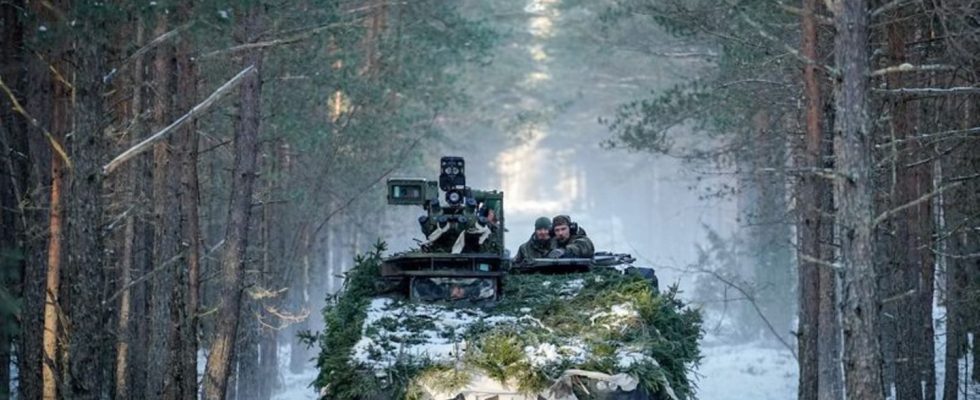armed forces
Brigade in Lithuania should be operational in 2027
Defense Minister Pistorius in the Boxer wheeled armored vehicle during the “Griffin Lightning” exercise in Lithuania. photo
© Kay Nietfeld/dpa
Defense Minister Pistorius calls it a “historic moment.” In Lithuania he agreed on the roadmap for the permanent stationing of a robust and combat-ready brigade on NATO’s eastern flank.
In their roadmap signed in Vilnius, the two ministers reaffirm their states’ commitment to “defend each other and every inch of Alliance territory at all times and to protect our freedom and democracy in accordance with Article 5 of the Washington Treaty.” Russia’s ruthless war of aggression against Ukraine has radically changed the security situation.
The document specifies what is necessary for the permanent stationing of up to 5,000 Bundeswehr personnel in Lithuania. Lithuanian Defense Minister Arvydas Anusauskas said after the signing that Russia was the biggest threat to the Baltics after the war of aggression against Ukraine and could be capable of aggression in three, eight or ten years, according to different scenarios. “The threat is great and no matter how we assess the time frame, we must prepare,” he said.
Intergovernmental agreement
Lithuania borders Belarus, which is an ally of Russia, and the Russian Baltic Sea enclave of Kaliningrad. A narrow land corridor runs west between the two – the so-called Suwalki Gap, over which fighting could break out in the event of an attack. Germany’s stationing of troops in the country is a desired reassurance for the Lithuanians of their obligation to provide assistance.
After the new brigade is formally set up in 2025, the material and number of troops are expected to grow, especially by 2026. This is referred to in the paper as a “transitional phase”, in which the brigade is already being led from Lithuania while parts are still being brought together in Germany. Details should be regulated in technical agreements. The legal status of German soldiers in Lithuania is to be determined in an intergovernmental agreement.
Two combat troop battalions from Bavaria and North Rhine-Westphalia are to be relocated as the core of the new brigade. The third battalion will be the multinational NATO battle group (eFP battle group) in Lithuania, which is already in the Baltic state under Germany’s leadership and has rotating personnel. There are also logisticians, medical soldiers, communications experts and administrative staff. Exact information about the necessary weapons purchases and the costs of the project are still being examined. Pistorius said that in Germany a brigade costs 25 to 30 million euros per month.
The two states undertake to create conditions so that Bundeswehr members can bring their families with them. The soldiers should be able to find accommodation on the free housing market or in new residential areas that are to be developed. “To ensure healthcare, it is important to rely on the Lithuanian healthcare system,” the document says. And: “Germany intends to set up one or two Bundeswehr schools as well as German-speaking childcare facilities.”
Pistorius emphasized that the deployment was “new territory for the Bundeswehr”. “Never before has the Bundeswehr, Germany, permanently stationed troops outside of Germany with a permanent base of soldiers.” In the past it was “always temporary, rotating assignments”.
After the signing and political talks in Vilnius, the SPD politician paid the German soldiers currently deployed in Lithuania a pre-Christmas visit to their barracks in Rukla. This has become a tradition since the men and women of the Bundeswehr have been deployed abroad. Previously, he visited a tank repair shop where the Leopard 2 main battle tanks delivered by Germany to Ukraine are maintained and war damage repaired.

